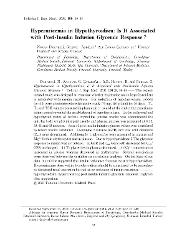| dc.contributor.author | Dariyerli, Nuran | |
| dc.contributor.author | Andican, Gülnur | |
| dc.contributor.author | Çatakoğlu, Alp Burak | |
| dc.contributor.author | Hatemi, Hüsrev | |
| dc.contributor.author | Burçak, Gülden | |
| dc.date.accessioned | 2019-06-27T08:00:58Z | |
| dc.date.available | 2019-06-27T08:00:58Z | |
| dc.date.issued | 2003 | |
| dc.identifier.issn | 0040-8727 | en_US |
| dc.identifier.issn | 1349-3329 | en_US |
| dc.identifier.uri | https://hdl.handle.net/20.500.12469/190 | |
| dc.identifier.uri | https://doi.org/10.1620/tjem.199.59 | |
| dc.description.abstract | This experimental study was designed to examine whether hyperuricemia in hypothyroidism is associated with insulin resistance. For induction of hypothyroidism rabbits (n = 12) were administered methimazole orally (75 mg/100 g food) for 30 days. T-3 T-4 and TSH values measured in plasma prior to and at the end of the experimentation period revealed the establishment of hypothyroidism. In the euthyroid and hypothyroid states of rabbits crystalline porcine insulin was administered (0.1 unit/kg body weight) intraperitoneally and plasma glucose was measured at 0 15 30 45 and 60 minutes. Sum of post insulin infusion glucose values was considered to reflect insulin resistance. Creatinine clearance (GFR) and uric acid clearance (C-uA) were determined. Additionally triglycerides were measured in plasma and Mg2+ both in erythrocytes and in plasma. Due to hypothyroidism: i) The glycemic response to insulin was not altered. ii) GFR and C-uA were both decreased but C-uA/GFR unchanged. iii) Triglycerides in plasma decreased. iv) Mg2+ concentration increased in plasma whereas decreased in erythrocytes. Several associations were observed between the variables on correlation analysis. On the basis of our data it could be suggested that insulin resistance does not exist in hypothyroidism. Hyperuricemia observed in hypothyroidism should be considered to be secondary to decreased renal excretion but not as an indicator of insulin resistance. (C) 2003 Tohoku University Medical Press. | en_US] |
| dc.language.iso | eng | en_US |
| dc.publisher | Tohoku Univ Medical Press | en_US |
| dc.rights | info:eu-repo/semantics/openAccess | en_US |
| dc.subject | Hypothyroidism | en_US |
| dc.subject | Hyperuricemia | en_US |
| dc.subject | Post insulin infusion glycemic response | en_US |
| dc.subject | Triglycerides | en_US |
| dc.subject | Magnesium | en_US |
| dc.title | Hyperuricemia in hypothyroidism: Is it associated with post-insulin infusion glycemic response? | en_US |
| dc.type | article | en_US |
| dc.identifier.startpage | 59 | en_US |
| dc.identifier.endpage | 68 | |
| dc.relation.journal | Tohoku Journal of Experimental Medicine | en_US |
| dc.identifier.issue | 2 | |
| dc.identifier.volume | 199 | en_US |
| dc.identifier.wos | WOS:000182195500001 | en_US |
| dc.identifier.doi | 10.1620/tjem.199.59 | en_US |
| dc.identifier.scopus | 2-s2.0-1642476416 | en_US |
| dc.institutionauthor | Çatakoğlu, Alp Burak | en_US |
| dc.relation.publicationcategory | Makale - Uluslararası Hakemli Dergi - Kurum Öğretim Elemanı | en_US |
| dc.identifier.pmid | 12705351 | en_US |
















